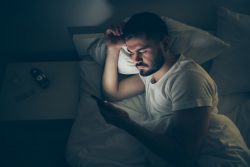Sleep Problems? Your Phone May Be to Blame
September 8, 2021
Spending a large portion of the day on your smartphone? Join the club! Whether you are checking social media, playing games, or taking care of tasks for work, your phone presents a world of possibilities for entertainment and productivity. As useful as phones are, they do have some downsides—your phone might even be making it difficult for you to get the sleep you need to be healthy and happy. Let’s talk about the relationship between cell phones and sleep, and what you may be able to do to get the high-quality shuteye you need and deserve.
Phones Steal Sleep
When you are ready to go to sleep, you might pick up your phone with the thought, “I’ll just spend a few minutes looking at it.” However, it is common for people to spend much more than a few minutes looking at their phones while they lie in bed. You could unintentionally push your bedtime back to the point where you can’t possibly get a solid 7–8 hours of sleep before you have to get up in the morning.
Also, keep in mind that phones are designed to grab your attention. Vibration and noises from notifications throughout the night can lead to fragmented sleep and even “sleep texting.” This disrupts your sleep cycle and prevents your sleep from being as refreshing as it ought to be.
Blue Light Stimulation
Phones and other mobile devices produce blue wavelengths of light. During the daytime, blue light isn’t necessarily a bad thing because it can boost reaction times and mood. At night, though, it can suppress melatonin secretion. Melatonin is a hormone that encourages relaxation and sleep, and it plays an important role in your body’s circadian rhythm. Disrupting this natural rhythm is detrimental to sleep.
Some people try to address this issue by activating their phone’s blue light filter, but that may not be the easy solution that it seems. One Harvard Medical School sleep researcher commented, “There [are] actually no studies that have systematically seen [whether] blue-depleted light at very dim intensities is effective in preventing or reducing the biological disruption caused by light exposure at night.
What You Can Do
Here are a few tips to help you reduce your phone’s effects on your sleep:
- Use an alarm clock instead of the alarm on your phone, so you can keep your phone out of the bedroom at night.
- Stop using your phone about an hour or two before you go to bed.
- If you are worried that you might miss something important, change the settings on the phone so only certain types of notifications pop up.
If controlling the use of your phone doesn’t noticeably improve the quality of your sleep, there might be other issues that you need to address. You may need to visit a sleep specialist to talk about the possibility that sleep apnea or another disorder could be robbing you of the rest you need.
Cell phones and sleep don’t go well together! Setting your technology aside at night may be the key to getting the restful sleep your body needs. Don’t worry, your phone will be there when you wake up.
Meet the Sleep Expert
Dr. Kenneth Mogell, a board-certified specialist in sleep medicine with over 10 years of experience treating sleep breathing disorders is the practice’s founder and primary practitioner. The practice has three South Florida locations: Melbourne, Vero Beach, and Boca Raton. To learn more about Florida Dental Sleep Disorders and Dr. Kenneth Mogell, contact our team at 844-294-7559.
